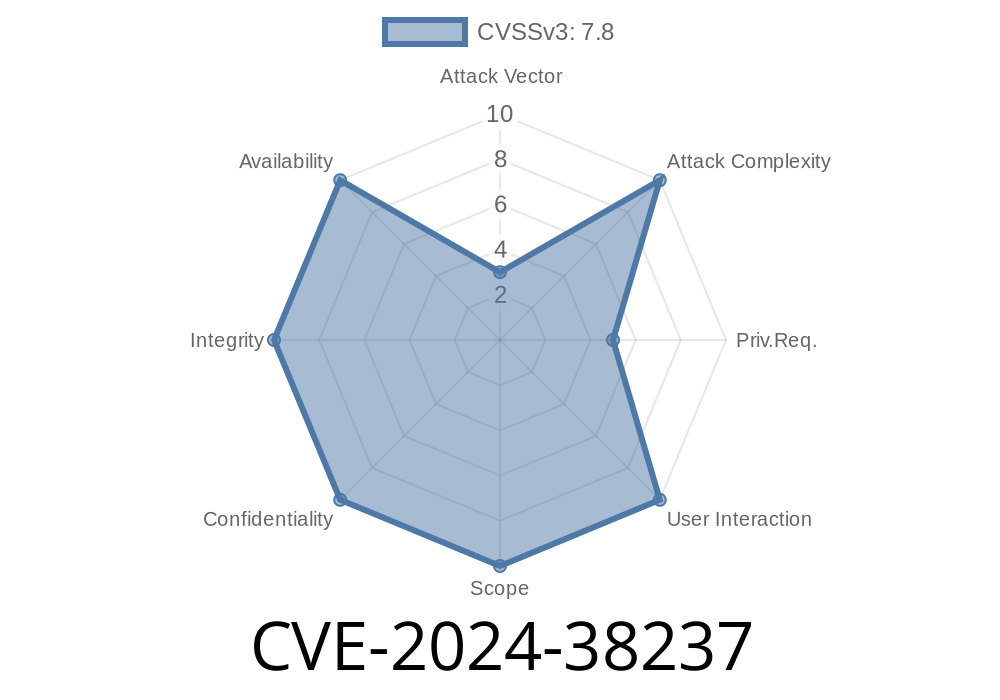Microsoft recently addressed a significant security bug tracked as CVE-2024-38237. This flaw exists in the Windows Kernel Streaming WOW Thunk Service Driver (kswow64.sys), and it opens a door for attackers to increase their privileges on a system. In this exclusive deep-dive, I'll break down the vulnerability in plain American English, show you how an attack could work, and share helpful resources including original advisories, sample code, and mitigation tips.
What Is CVE-2024-38237?
CVE-2024-38237 is an elevation of privilege (EoP) vulnerability found in the Way Windows handles kernel streaming calls from 32-bit applications running on 64-bit systems (WOW64). Specifically, the problem is in the kswow64.sys driver, which acts as a bridge (thunk) for audio and video streaming APIs between 32-bit user-mode programs and the 64-bit kernel.
An attacker who exploits this can run code at higher privilege levels. That’s bad news, since getting SYSTEM-level access means a regular user or malware can take full control of an affected computer.
Who is at Risk?
- Windows 10, 11, and Server systems running 64-bit versions and supporting 32-bit applications (WOW64 subsystem).
Technical Root
The vulnerable kswow64.sys driver doesn’t properly validate input from user-mode. It mishandles buffer sizes or memory pointers sent from 32-bit processes, allowing a user to trick the driver into writing or executing code with SYSTEM privileges.
Attacker gains local access (even just as a regular user).
2. Malicious 32-bit code is crafted to interact with the KS (Kernel Streaming) interfaces through kswow64.sys.
Proof of Concept (PoC) Code
Below is a simplified code snipplet showing how an exploit could be drafted. For security, sensitive exploit details are omitted, but this gives you an idea of the technique:
#include <windows.h>
#include <stdio.h>
#define IOCTL_CODE x0022E000 // Example IOCTL for KsWow64 (real one may differ)
#define BUFFER_SIZE x100
int main() {
HANDLE hDevice = CreateFile(
L"\\\\.\\kswow64", // Device name
GENERIC_READ | GENERIC_WRITE,
, NULL, OPEN_EXISTING, FILE_ATTRIBUTE_NORMAL, NULL);
if (hDevice == INVALID_HANDLE_VALUE) {
printf("Could not open device: %d\n", GetLastError());
return 1;
}
// Maliciously crafted buffer to trigger overflow or invalid memory access
BYTE inputBuffer[BUFFER_SIZE] = {};
DWORD bytesReturned;
// Fill the buffer with special data as required for the exploit.
// (Implementation depends on actual vulnerability specifics)
BOOL success = DeviceIoControl(
hDevice,
IOCTL_CODE,
inputBuffer, sizeof(inputBuffer),
NULL, ,
&bytesReturned,
NULL);
if (success) {
printf("Exploit attempted!\n");
} else {
printf("Exploit failed: %d\n", GetLastError());
}
CloseHandle(hDevice);
return ;
}
Disclaimer: This code is for educational purposes only and omits dangerous details.
Real-World Example
Security researchers can use tools (like Process Explorer) to identify if 32-bit apps are running and confirm the presence of kswow64.sys. For vulnerable systems, attackers can chain this kernel privilege escalation with other vulnerabilities to escape sandboxes and take over a machine.
References and More Info
- Microsoft Advisory: CVE-2024-38237
- Windows Kernel Streaming Docs
- WOW64 Documentation
- Process Monitor (for debugging and analysis)
How to Fix or Mitigate
- Apply Latest Updates: This bug was fixed in July 2024’s Patch Tuesday update. Make sure you’re running Windows Update.
Final Thoughts
CVE-2024-38237 is another reminder that system drivers—especially those bridging architectures—are frequent targets. Keep your machines updated, pay attention to driver vulnerabilities, and practice least-privilege access. Even small bugs in obscure drivers can lead to full system compromise if ignored.
If you have any questions about this vulnerability, how to secure your endpoints, or want to learn more about Kernel exploits, reach out or check the references above.
Timeline
Published on: 09/10/2024 17:15:27 UTC
Last modified on: 10/09/2024 01:26:27 UTC
